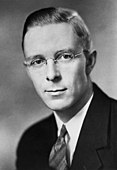Alberta general election, 1967
|
|
|||||||||||||||||||||||||||||||||||||||||||||||||||||
|---|---|---|---|---|---|---|---|---|---|---|---|---|---|---|---|---|---|---|---|---|---|---|---|---|---|---|---|---|---|---|---|---|---|---|---|---|---|---|---|---|---|---|---|---|---|---|---|---|---|---|---|---|---|
|
|||||||||||||||||||||||||||||||||||||||||||||||||||||
|
|
|||||||||||||||||||||||||||||||||||||||||||||||||||||
|
65 seats in Legislative Assembly of Alberta 33 seats were needed for a majority |
|||||||||||||||||||||||||||||||||||||||||||||||||||||
|
|||||||||||||||||||||||||||||||||||||||||||||||||||||
|
|||||||||||||||||||||||||||||||||||||||||||||||||||||
The Alberta general election of 1967 was the sixteenth general election for the Province of Alberta, Canada. It was held on May 23, 1967 to elect members of the Legislative Assembly of Alberta.
Ernest C. Manning led the Social Credit Party to its ninth consecutive majority government, winning 55 of the 65 seats in the legislature, despite getting less than 45% of the popular vote. This proved to be an ominous sign for the party; it had not won less than half the popular vote since 1955.
The once-moribund Progressive Conservatives, led by young lawyer Peter Lougheed, emerged as the main opposition to Social Credit. They won over a quarter of the popular vote and six seats, mostly in Calgary and Edmonton. Social Credit was slow to adapt to the changes in Alberta as its two largest cities gained increasing influence.
Despite losing close to half of the share of the popular vote they had won in the 1963 election, the Liberals managed to increase their number of seats from two to three as a result of the decline in the Social Credit vote.
Voters also decided upon the adoption of daylight saving time, in a province-wide plebiscite. It was defeated by a very slim margin with 51.25% voting against.
This was the first Alberta election in which Treaty Indians had the right to vote.
...
Wikipedia

